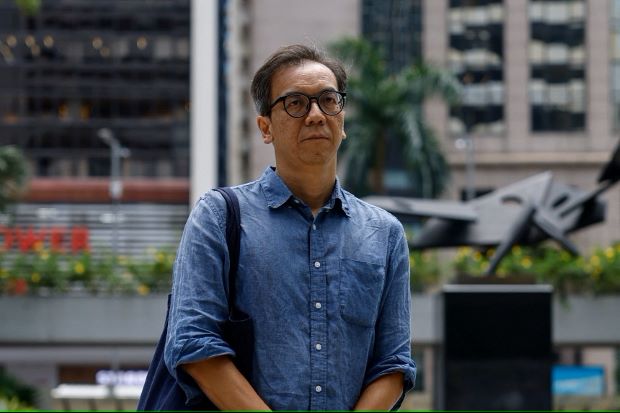Hong Kong editors sentenced in landmark case
By Tiffany May
HONG KONG — A judge in Hong Kong on Thursday (26) handed down sentences to two editors in a landmark case that showed how a crackdown by China has curtailed press freedoms in the once-freewheeling city.
The two journalists, Chung Pui-kuen, and his successor, Patrick Lam, were convicted in August of conspiring to publish seditious materials on Stand News, a now-defunct pro-democracy news site. Chung was sentenced to 21 months, and Lam, who has a serious health condition, to the time he had already served between his arrest and his release on bail — slightly less than a year.
Stand News, like several other news outlets in Hong Kong, was once an example of the civil liberties the city offered that were unimaginable in the rest of China. It pursued investigations exposing the government’s failures and gave voice to the city’s beleaguered pro-democracy movement.
After anti-government protests roiled Hong Kong in 2019, Beijing crushed the opposition with a powerful national security law. But Stand News continued to publish pro-democracy voices in editorials and interviews.
The outlet closed after Chung and Lam were arrested in December 2021, when hundreds of police officers raided the newsroom and collected boxes of evidence.
After their arrests, both journalists were detained for nearly a year before being released on bail. Their trial started in October 2022 and lasted nearly two months, with the verdict postponed three times.
On Thursday, Lam, who has a rare kidney disorder that requires dialysis and frequent medical monitoring, was told he could walk free. Chung stood in the glass witness box, waiting to be taken back into custody. Former colleagues waved to him as they were ushered out of the courtroom. Chung smiled and waved back.
In a letter to the judge after his conviction, Chung wrote that he believed that many people in Hong Kong still supported free expression and an independent press.
“Some of them care about the freedom and dignity of everyone in the community and are willing to pay the price of losing their own freedom,” he wrote. “It is the unshakable responsibility of journalists to report their stories and thoughts truthfully.”
Rights activists and journalist groups say the prosecution of the Stand News editors made clear the decline of press freedom in the city and raised questions about what journalistic activities the authorities might consider illegal. The Hong Kong Journalists Association, which itself has become a target of government criticism, has said it opposed using sedition laws to “prosecute people exercising their constitutional right to conduct journalism”.
In a statement in August, the Foreign Correspondents’ Club said that the Stand verdicts sent “shock waves through Hong Kong newsrooms, as well as international news organizations with bureaus in the city, as they seek to understand whether their day-to-day operations could be in violation of Hong Kong law”.
The government has hit back at those raising concerns about press freedom. “Journalists, like everyone else, have an obligation to abide by all the laws,” a government statement said. “Their freedom of commenting on and criticizing government policies remains uninhibited as long as they do not violate the law.”
Nonetheless, officials have made clear the lines have been redrawn. Stand News’ closure was preceded by the shutdown of Apple Daily, a rambunctious, pro-democracy publication owned by media mogul Jimmy Lai, who is himself on trial for national security charges. Several journalists and photographers have been denied work visas or barred from entering the city, including an Associated Press photographer who previously photographed Lai walking in a barbed wire enclosure. After a political cartoonist, Zunzi satirized the police, government officials denounced him repeatedly until the newspaper where he had worked for four decades suspended his cartoon column.
Many local news outlets have stopped reporting on efforts by Hong Kong activists, now in exile, who draw attention to China’s crackdown on the city. Other news sites have taken to placing disclaimers at the bottom of editorials saying that the opinions of editorial writers did not reflect those of the outlet and that there was no intention to violate the national security law.
Beyond facing legal risks, dozens of journalists, their families and neighbours have been targets of what appeared to be a systematic harassment campaign, including death threats, ransom letters and online trolling, the Hong Kong Journalists Association said this month.
Hong Kong authorities have also engaged in a broader crackdown on dissent. According to a database maintained by researchers at the Georgetown Centre for Asian Law, nearly 300 people have been arrested on national security or sedition offences, with more than 70 convicted.
More than 30 opposition lawmakers and prominent activists await sentencing in a mass trial. In a separate case, Lai, the media tycoon accused of conspiracy and collusion with foreign forces, faces what many experts expect will be a lengthy prison sentence.
Before announcing the sentences on Thursday, Judge Kwok Wai-kin said that imprisonment was the “only appropriate punishment” for publishing articles he described as seditious. Stand News was not solely a news outlet without a political stance, he said, but rather it was a participant in a movement at a time when many lacked trust in the government.
Some editorials failed to provide context and balanced analysis, he said, and a star reporter later ran for office as an opposition candidate. The cumulative effect, he said, was “serious, unquantifiable harm to the public.”
-New York Times



Comments are closed, but trackbacks and pingbacks are open.